Get Carter is a classic 1970s British crime film that is good, but far from great.
Having seen the remake of the film first I had high expectations for this one. Unfortunately my expectations weren't entirely met, and I was mildly disappointed.
Michael Caine plays the principal role of Jack Carter; a malicious London gangster. Carter travels to Newcastle for the funeral of his recently deceased brother. Upon arrival in Newcastle he begins asking questions about the death of his brother and suspects that it was no accident, but foul play was involved. Carter begins interviewing people who were associated with his brother and starts putting together the pieces of the puzzle to solve the crime.
As Carter is slowly getting somewhere with his personal investigation, the underworld crime bosses wish to get him out of the picture to avoid the truth being uncovered.
Regrettably, you will have to be a mind reader to understand the inscrutable conversations between the central characters. Even though watching the movie closely, I was none the wiser until the characters finally spelt it all out in the concluding 15 minutes.
Unfortunately the film's slow pacing dramatically affects its overall value. And the final showdown was quite unsatisfying. It was unexpected, sure, but the ending is one of the many factors that affect the quality of the experience.
Michael Caine was cool and charismatic in the title role. He is quite the ladies man, and displays this with the endless amount of women he ends up sleeping with throughout the movie.
Which brings me onto my next point - the film contains too much sexual content for my taste. Not that it was overly distasteful, but every time Carter sleeps with another girl the audience gets the sense of "here we go again". It got highly tedious towards the end as well as getting quite discomforting.
For a 1970s production there was a shocking amount of nudity. It's not overly graphic but it has its fair share of bare breasts, bottoms and bed scenes. For its time I'm sure it would have raised a few eyebrows because said scenes certainly raised mine. And the violence undoubtedly packs one heck of a wallop.
The atmosphere of the movie was quite superb for a British film. The authentic locations give the audience a sense of dread and decay. Especially with scenes set during overcast or rainy weather. The film has been made quite well, with effective cinematography and a valuable score that solidifies its solid atmosphere.
Kudos to the director as well, who added to this atmosphere of such despair. On top of this the film has more to offer: brutal, hard-hitting action as well as a high level of violence.
Get Carter is far from being a masterpiece due to its flaws, but sits amongst some of the finest films to be imported from Britain.
Overrated, but brutal and hard-hitting
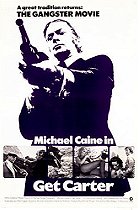 Posted : 17 years ago on 21 April 2008 11:47
(A review of Get Carter (1971))
Posted : 17 years ago on 21 April 2008 11:47
(A review of Get Carter (1971)) 0 comments, Reply to this entry
0 comments, Reply to this entry
Michael Mann's finest hour
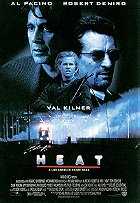 Posted : 17 years ago on 21 April 2008 11:45
(A review of Heat)
Posted : 17 years ago on 21 April 2008 11:45
(A review of Heat)
Heat is an absolutely stunning film; this epic, brilliant crime drama is unmissable and unforgettable.
Many will lose interest due to the film's length, but I found the film essentially perfect despite the running time.
First of all, Robert De Niro and Al Pacino in the same movie. These are two of the best actors on the planet, and both are in top form. The script (written by director Mann) is nothing short of remarkable. The dialogue is always witty, realistic, and is never contrived. The actors further cement this realism in an amazing way.
Mann's direction for every second of the movie was stunning. The way Mann approached this movie was destined to equal excellence. First of all, he penned the damn fine screenplay himself and thus knew what he wanted on screen. Second, he employed incredible cinematographic techniques to achieve his vision. And finally, he knew what actors he wanted and was not going to stop until the result is exactly the way he wants it. Even a dialogue scene between De Niro and Pacino can sustain interest in the viewer without showing any action.
Neil McCauley (De Niro) is a thief who indulges in precision jobs along with his team of professionals. After the robbery of an armoured car, the police are now investigating. Vincent Hanna (Pacino) leads the investigation. Hanna is a master at his profession, and McCauley is at the peak of his.
This epic crime film then becomes a game of cat-and-mouse as Hanna works to bring McCauley to justice. In amidst this, we have plenty of time for a character study as Mann digs in-depth into the private lives of the protagonists.
And of course, the occasional action scene is both spectacular and incredibly violent at times. The action scenes are crafted to perfection, with cinematography that blew me away.
De Niro and Pacino share very little screen time together, but when those two are in a scene together the results are unbeatable. The memorable scene at the diner between De Niro and Pacino is something we rarely ever see in a movie - great script, great direction, great performances. And the final showdown isn't your usual "good guy/bad guy" showdown but something a lot deeper.
The highlights of the movie include magnificent cinematic techniques during the few action scenes, and the wonderful performances from everyone in the cast.
Michael Mann's Heat is absolutely unmissable. This epic crime story is most definitely one of the best movies ever made. If you have not yet seen it, I urge you to get a copy of this film in your hands immediately.
 0 comments, Reply to this entry
0 comments, Reply to this entry
One of 2007's best films!
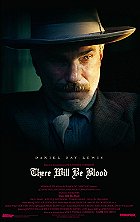 Posted : 17 years ago on 21 April 2008 11:43
(A review of There Will Be Blood)
Posted : 17 years ago on 21 April 2008 11:43
(A review of There Will Be Blood)Words cannot do justice to accurately describe this movie; Paul Thomas Anderson's There Will Be Blood is an unmissable event and without doubt one of the best movies to hit cinemas during 2007.
This is another of those masterpieces that separates those who love the blockbusters and those who love good filmmaking. In order to appreciate the movie, you must be in the latter category.
Daniel Day-Lewis completely stole the show here; his portrayal is unlike anything I have seen in such a movie. Set in the oil fields at the turn of the 20th Century, the film chronicles the rise of prospector Daniel Plainview (Day-Lewis) who becomes an independent oil man. He becomes a very wealthy man as his oil wells begin to take in lots of money.
This sprawling epic is a tale about greed, corruption and the pursuit of the American dream. Focusing heavily on the troubles and dangers of working at an oil well; some of the scenes of brilliant, compelling drama are never likely to be seen again. This powerful drama is reliant on performances by the actors; without Day-Lewis or the members of the supporting cast the film would not have succeeded. There are many other memorable characters who are developed perfectly over the running time, but it would take too long to talk about each individual, brilliant performance.
The film is a prime example of a modern masterpiece with improper marketing. The marketing campaign for the movie didn't do much for me, and it was only after the reviews I read that sparked an interest in seeing it.
The script is exceptionally well written. There Will Be Blood is a character study that shows us many scenes of drama and development of characters. Because of the strong script (based on Upton Sinclair's novel "Oil!") and remarkable direction, the film works. We can feel the tension between the characters due to such accomplished performances.
Overall, There Will Be Blood is among the finest films to hit cinemas during 2007. In a year filled with disappointing sequels and remakes, it's great that masterpieces like these get made. Highly recommended if you can spare 150 minutes of your time.
 0 comments, Reply to this entry
0 comments, Reply to this entry
Coen Brothers' finest hour!
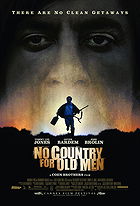 Posted : 17 years ago on 21 April 2008 11:42
(A review of No Country for Old Men)
Posted : 17 years ago on 21 April 2008 11:42
(A review of No Country for Old Men)The Coen Brothers have had their finest hours and weakest hours, but No Country for Old Men will forever stand as their best hour. The film just manages to beat Fargo (a film which I loved) with its mix of engaging drama and a script that doesn't feel compelled to follow the standard conventions.
The trailers didn't do much for me, and I was a little bit apprehensive at first...but it raked it awards endlessly and I felt like it was my duty to investigate. Boy am I glad that I did. "Do not judge a book by its cover" is all the advice I can give you in this case.
A hunter named Llewelyn Moss (Brolin) stumbles across a pile of dead bodies, a stash of heroin and millions of dollars in cash. After collecting the money for himself, he is endlessly stalked by a madman named Anton (Bardem). Violence and mayhem ensue as the bloodbath commences, and there will be no stopping it until someone is dead.
The plot is a lot more complex and interesting, but I found the film more enjoyable when I didn't know where it was going. Every scene is filled with intelligent dialogue and necessary character development. On top of this, the Coen Brothers have injected their special kind of subtle humour into the mix.
The film is incredibly violent, and some of the scenes are really hard to stomach. But the film is well made, and once the intensity begins it never eases up. During some of the scenes I was on the edge of my seat, with the slightest noise causing me to jump uncontrollably.
The way that the film is constructed and crafted is superb. There is not a scrap of music to be found during the film. Only during the end credits. Without music, we are able to be further engaged in the action, and I think we're more able to feel a certain character's emotions to an extent that can't be beaten.
The ending was something that had me thinking for about half an hour as it felt incomplete at first, but then I realised how clever and unconventional it is, albeit quite sudden. The ending just put things into perspective and kept the story out of standard Hollywood territory.
Kudos to the Coen Brothers for keeping the violence taut, the dialogue worthwhile and the characters realistic. Although I had little hopes for this film, No Country for Old Men is one of 2007's best movies and truly worthy of its Oscar nominations.
 0 comments, Reply to this entry
0 comments, Reply to this entry
A superlative valentine to Hollywood action films
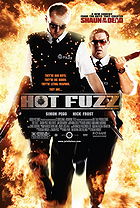 Posted : 17 years ago on 21 April 2008 11:40
(A review of Hot Fuzz)
Posted : 17 years ago on 21 April 2008 11:40
(A review of Hot Fuzz)Edgar Wright and Simon Pegg's second feature film collaboration, 2007's Hot Fuzz furthers the pair's cinematic interests that were previously established in 2004's excellent Shaun of the Dead. It's easy to parody a film genre, but it's another thing entirely to achieve a parody that simultaneously works as an effective entry to the genre it sends up. Shaun of the Dead accomplished this extraordinary balancing act, and Hot Fuzz pulls off a comparable miracle. Simply labelling Hot Fuzz as a parody would drastically undersell this gem - it's a loving valentine to Hollywood action flicks, with their overblown absurdity, macho posturing, gratuitous violence and frenetic camerawork. And with Wright and Pegg masterminding the project, the result is a home run, a riotously funny British comedy brimming with wit and energy.

A hard-nosed, career-focused London police officer, Nicholas Angel (Pegg) is so exceptional at his job that he makes his far lazier colleagues look bad in comparison. Receiving a promotion to sergeant, Angel is forced by his superiors to relocate to the small country town of Sandford, where crime is rare and there hasn't been a recorded murder in decades. Partnered with overeager action film buff Danny Butterman (Nick Frost), Nicholas is appalled at the lenience afforded to both the public and the incompetent police force, with the village's Chief Inspector (Jim Broadbent) eager to bring his new officer down a couple of pegs as Nicholas hands out speeding tickets and arrests petty shoplifters. However, Nicholas's interests are soon piqued by a series of "accidents" that may not be accidents. Suspecting foul play, Nicholas finds himself the only one prepared to deal with the situation adequately.
Hot Fuzz's primary target of adoration and satire is the buddy action movie, with the screenplay referencing and paying homage to everything from Bad Boys II to Point Break, and even the Miami Vice TV show. Danny is particularly fond of post-mortem one-liners, and he relishes the chance to educate his new partner by showing him as many Hollywood productions as possible. The real beauty of Hot Fuzz is that, on top of being funnier than most comedies, it has a story to tell, and the narrative is given a surprising amount of attention. The central mystery provides genuine intrigue, and there are stakes here, not to mention Wright manages to deal with plot and characterisation sufficiently whilst maintaining incredible narrative velocity. Other satirical targets include murder mysteries, with the genre's convoluted motives and investigations given a brilliant dressing down. Wright gets plenty of mileage from the picture's satirical elements, but the screenplay is also full of side-splitting one-liners and uproarious bantering. Above all, the gags aren't dumb or obvious; the humour is more cerebral, which is more satisfying than broad American comedies. Wright and Pegg's script is a work of art, and the on-screen execution is flawless.

Aesthetically, Wright sets out to ape the Tony Scott style of contemporary action filmmaking with frenzied camerawork, rapid-fire editing, extreme close-ups and overblown sound effects. Yet, Wright ultimately manufactures a style that is distinctly his own, and above all, he succeeds in crafting kick-ass action sequences that are both exhilarating and amusing. Wright's exaggerated technique delivers the lion's share of laughs - for instance, the shortest police pursuit in movie history is turned into a frenzy of over-editing and zoom-heavy cinematography. It is a credit to Wright's directorial sleight-of-hand that he can employ these typically irritating gimmicks in a coherent and riveting way. The climactic action sequence is, naturally, the picture's centrepiece - a masterclass of action filmmaking. Gloriously R-rated and filled to the brim with creative ideas (witness an old lady wielding dual pistols on a bicycle), the climax sustains excitement and intensity despite running for the better part of twenty minutes.
Hot Fuzz is also played with an incredible poker face, as nobody involved in the picture seems to be in on the joke. (Witness the sincerity of the scenes involving a runaway swan.) Wright's directorial excellence goes beyond the action scenes, too - an early montage to convey Angel's transition from London to Sandford should be studied in film schools worldwide. American productions treat such sequences as homework, inserting drab second-unit footage set to some upbeat pop song, but, impossibly, Wright uncovers opportunities for further laughs and maintains the furious energy levels. It's superb craftsmanship all-round. Additionally, the original score by David Arnold (late of several James Bond movies) is exceptionally memorable and catchy, perfectly complementing Wright and cinematographer Jess Hall's slick visual compositions while also contributing to the momentum of each set piece. It isn't easy to believe this technical brilliance was accomplished on a paltry $16 million budget.

There is a heart at the centre of the story: the touching platonic bromance between Nicholas and Danny. Although the pair are polar opposites in terms of appearance and personality, they grow a particular fondness for one another, and it's a sweet friendship that grows organically. As the confident Nicholas Angel, co-writer Pegg is tasked with playing the archetypal macho action hero, and he's an ideal fit. Pegg slimmed down and trained hard to nail the role's physicality, and he's a terrific straight man to boot. As usual, though, it's Frost's turn as goofball Danny Butterman that stands out. Similar to his Shaun of the Dead role, Danny is naïve and childlike but also very lovable.
The supporting cast is packed with recognisable British names. One of the most notable actors is former James Bond Timothy Dalton, who contributes a fine performance as the shady Simon Skinner. As Sandford's chief inspector, Broadbent is expectedly great, while Paddy Considine and Rafe Spall score a handful of laughs as other members of the Sandford Police Force. There are even cameos from Bill Nighy, Steve Coogan and Martin Freeman, and Bill Bailey gets a small but amusing role. Other famous actors also pop in, including Paul Freeman (Raiders of the Lost Ark) and The Wicker Man star Edward Woodward. It's a full roster, and all thespians are spot-on, contributing laughs and plenty of colour.

Although Hot Fuzz does seem long in the tooth at first glance, it improves with repeat viewings when you can appreciate all the subtle nuances of the script and marvel at the sheer brilliance of the storytelling. It's deliberately full of genre clichés and pays homage to countless movies, yet Hot Fuzz also manages to be boldly original and unique. It walks the same fine line as Shaun of the Dead: it's hilarious, exciting, and sometimes oddly emotional. For fans of Shaun of the Dead and/or the TV show Spaced, Hot Fuzz is a gift.
10/10
 0 comments, Reply to this entry
0 comments, Reply to this entry
Sam Mendes is a legendary filmmaker.
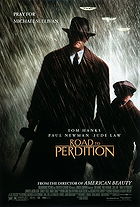 Posted : 17 years ago on 21 April 2008 11:39
(A review of Road to Perdition)
Posted : 17 years ago on 21 April 2008 11:39
(A review of Road to Perdition)Following Sam Mendes' success with his masterpiece American Beauty, I found Road to Perdition to be a stunning, captivating, brilliant gangster thriller. The film is one of the best additions to the gangster genre of late and places itself in the league of such other gangster greats as The Godfather and GoodFellas.
Tom Hanks is an Irish mob hitman named Michael Sullivan who has dedicated his life to his career. Sullivan feels very distant from his family, especially his children who don't really know what he does for a living. His son Michael Jr. (Hoechlin) is curious, and is challenged by his younger brother to follow their father to work one night. But that night his life is changed when he witnesses a brutal slaying.
Now Sullivan and his family are in danger as the mafia are afraid that little Michael will talk. The film then follows father and son as they flee their home town to avoid the wrath of the men Sullivan used to work for, and to ensure that young Michael does not end up like his father.
The plot is fairly simple and straight-forward, but expanded upon extremely well by the screenwriter. The film does not go on for very long at all when you compare it to the running time of the other gangster classics. And this works because it doesn't waste any time with boring dialogue, but keeps the audience enthralled in the action that is occurring.
But the prominent thing that was vital for the success of the movie was the performances by the cast. Each performance was engaging and vibrant, with Tom Hanks in what could be his finest hour. We have never seen Hanks like this before. He is very sadistic and quite soft spoken. It was in his accent that helped the audience feel so mesmerised by every line that he delivered. Newcomer Tyler Hoechlin was fantastic. He is still a reasonably young actor, but he was able to make the audience feel a sense of intensity during the more thrilling sequences. I was unable to recognise Jude Law in such a unique performance here. Playing a hitman who is sent to eliminate Hanks' character, he feels so evil and so mesmerised by what he's doing. With each line he gives the audience the impression that he's some kind of a mad man. He looks and sounds like a man on the edge, who is usually very calm and concentrated on the task at hand; be it killing someone or photographing a corpse. Daniel Craig was fascinating to say the least. He's not his usual wooden self, but a completely different person altogether. Paul Newman was superb as a mob boss.
Sam Mendes excelled himself in the directing aspect. It was the film's visual style that keeps the audience engrossed for the film's duration. He keeps the dialogue taut, and in the scenes of action (which are very rare, to say the least) he keeps the violence strong and highly realistic.
It was a magnificent creative choice about the dynamic sound design. The gunshots sound so loud and deafening compared to the dialogue or anything else. And hence the dialogue will sound faint, but audible, and then when a gun is fired it sounds so deafening and something we did not expect. The sound is very contrasting to keep the audience on the edge and it does a fantastic job of it.
Road to Perdition is an extremely good movie and will become a gangster classic. The beautiful Oscar-winning cinematography, the focused direction, the engrossing performances and the vigorous sound design all add up to one fantastic experience. Do yourself a favour, and watch it.
 0 comments, Reply to this entry
0 comments, Reply to this entry
Greatest Western of all time. Bravo!
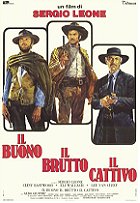 Posted : 17 years ago on 21 April 2008 11:38
(A review of The Good, the Bad and the Ugly)
Posted : 17 years ago on 21 April 2008 11:38
(A review of The Good, the Bad and the Ugly)The Good, the Bad and the Ugly is hands down the greatest western of all time - the third and final of Sergio Leone's trilogy of westerns with Clint Eastwood is the best of the bunch.
This film succeeds in every aspect where its predecessors failed, making it the essential spaghetti western. Clint Eastwood rides back into action as "The Man With No Name" - the good - who is now living in the time of the Civil War. Eli Wallach is a filthy outlaw named Tuco - the ugly. And finally Lee Van Cleef (returning from the cast of the previous film playing a different role) is a man known as Angel Eyes - the bad. In a remote cemetery an outlaw has buried a stash of $200,000 which immediately sparks interest from the 3 protagonists. Tuco and "The Man With No Name" form an uneasy alliance and have no choice but to trust each other when it's discovered that each possess half the information of the location of the hidden treasure.
Angel Eyes is also focused on finding the money and thus begins a race as the three men move through rugged landscape and across harsh deserts to get to their desired destination.
The Good, the Bad and the Ugly is a very unconventional western. The plot of this third instalment is actually pretty easy to follow, and this simplicity makes the film not as confusing as its predecessors.
Each moment of the film is enthralling, and exceptionally created. Although clocking at almost 160 minutes, the film is not too long. My interest was sustained for each minute of its running time; containing intriguing characters and clever set-ups.
Clint Eastwood is fantastic as always. As always he plays the part to perfection - never showing signs of emotion and always being dark. Eli Wallach was a welcome addition to the cast. He portrays a very realistic outlaw, and his character is most certainly "the ugly". I was disappointed that Lee Van Cleef didn't stick to his original character from For a Few Dollars More, but he still plays this new part exceptionally well.
Of course what addition to this trilogy would be complete without Sergio's magnificent direction and Ennio Morricone's triumphant score. Ennio's music is nothing short of remarkable.
The Good, the Bad and the Ugly is an enthralling western. For those with short attention spans, go rent a Michael Bay flick. But for those who enjoy good quality westerns and don't mind the slow pacing then go right ahead. One of the best movies of all time!
 0 comments, Reply to this entry
0 comments, Reply to this entry
Look past the slow pacing...
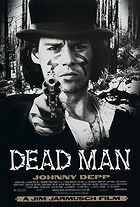 Posted : 17 years ago on 21 April 2008 11:36
(A review of Dead Man (1995))
Posted : 17 years ago on 21 April 2008 11:36
(A review of Dead Man (1995))
Dead Man is definitely not a film for all tastes. This stylish production is sometimes difficult to watch due to the grainy black and white imagery, not to mention some of the harsh images of violence and even cannibalism.
Certainly not your average western, we follow a young accountant from Cleveland named William Blake (Depp) who takes the train into a town for an accounting position. Coming into town dressed in a smart suit and carrying a briefcase, he is the odd one out among the murderers and outlaws. But he is informed that he is too late for the job despite pouring every cent he had into coming to the town. After a number of mishaps, William begins to undergo a massive physical, mental and spiritual journey.
William is a young man looking for a steady job, and ends up taking a tragic descent into personal oblivion as he transforms into a wanted outlaw being hunted by numbers of bounty hunters.
To assist in his spiritual journey, William is accompanied by an Indian named "Nobody" (Farmer) who is rich in the ways of his tribe and ancestors. The transformation from meek accountant to hunted outlaw is emphasized by the weight of the wounds William carries, both physically and spiritually. His world becomes increasingly distant and he becomes ever more reliant on his Indian companion.
Dead Man is told with very alluring, unique cinematography and a very certain style. The director's prominent use of fades to cut shots together works exceptionally.
The film is also very ambiguous, told with deliberately slow pacing and performances that wouldn't normally grasp one with a short attention span. This style will not be embraced by modern audiences who crave fast-paced action, but the film will be adored by those who love art house cinema.
The director, Jim Jarmusch, struck massive success with the movie. He was finally discovered with the release of this movie, mainly due to the lead role being portrayed by Johnny Depp.
Depp's performance is sublime. He is able to let the audience empathize with his situation while never looking entirely vulnerable to his surroundings. The transformation of Depp's character was crucial for the success of the movie, and Depp played his role to perfection. If Depp isn't the greatest actor of all time, I don't know how to describe him.
The musical score is good at times, and creates a very haunting atmosphere to compliment the already exceptional visual images. At a glance, many might see Dead Man as one to leave on the shelf. If you crave simple mindless garbage that Michael Bay rolls out, you are correct to leave it alone. But if you are looking for a multi-layered production rich in messages about life, then I suggest you pick this one up without hesitation. I couldn't recommend this any higher.
 0 comments, Reply to this entry
0 comments, Reply to this entry
It will leave you speechless...
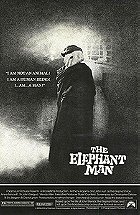 Posted : 17 years ago on 21 April 2008 11:35
(A review of The Elephant Man)
Posted : 17 years ago on 21 April 2008 11:35
(A review of The Elephant Man)Based on a true story, The Elephant Man is a drama that unconditionally blew me away.
The film is a dramatisation of the life of Englishman Joseph Merrick (Hurt), known as John in the film, who was born with a grotesque physical deformity. Due to the nature and severity of the man's malformation he is unfortunately condemned to a life as a circus freak as people profit by displaying him in a freak show.
But all this changes when a London surgeon named Frederick Treves (Hopkins) discovers John in a street freak show. Frederick notices that John is also suffering from severe injuries due to improper action on the part of his owner. To treat his injuries, John is moved to a London hospital where Frederick also studies John's anatomical structure.
But while John is in hospital it is discovered that although suffering from rigorous deformities, underneath he is in fact a highly intelligent man capable of discernable speech, cerebral thought and sensitivity. Frederick is determined to make sure John is never mistreated again and isn't looked upon as just a freak with a physically deformed face.
This altruistic act of compassion and benevolence alters John's life forever. The film was shot in grainy black and white. In many ways this style suits the film perfectly. The picture looks dated; almost like genuine footage shot during the turn-of-the-century in London. I couldn't fault anything that I saw on the screen. Everything was able to catch my eye. Costumes looked authentic and the sets create the desired atmosphere of 19th Century London.
The make-up was outstanding! Every time the character of John 'The Elephant Man' appears on screen you can't recognise actor John Hurt underneath the elaborate make-up. His face looks authentically deformed and helps the audience get engaged in the film a lot easier.
On the topic of the performance, though, I get goose-bumps at the thought. John Hurt was robbed of his Oscar. The man's performance was a textbook example of portraying a character perfectly. His character is so poignant and so powerful. The world around him is so malevolent and prejudiced due to his appearance and we feel his pain like it's actually happening to us. The first time he utters a word in character I was in tears. And I stayed like that for the whole movie. I cried like a baby. And the thought that it actually happened and there was a real man of such animalistic appearance...made me cry even harder.
Anthony Hopkins was the ideal choice for his character of a London surgeon. I couldn't fault him anywhere because he's always so focused on bringing life to his character.
Many will not recognise this work being under the cap of director David Lynch. The storytelling isn't as bizarre or unusual as the kind of movies he became famous for. Instead the film is told using straight-forward storytelling that sometimes uses peculiar imagery to convey the situation to the audience. These instances include montages utilising images of elephants that contrast to the title character's outward show. Editing was sublime in these certain instances.
Overall, The Elephant Man is a brilliant piece of filmmaking in every sense of the word. The film is powerful, moving and unfathomably astounding. I cried for most of the film's duration. You will too.
 0 comments, Reply to this entry
0 comments, Reply to this entry
Very funny and immensely entertaining!
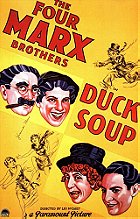 Posted : 17 years ago on 21 April 2008 11:34
(A review of Duck Soup)
Posted : 17 years ago on 21 April 2008 11:34
(A review of Duck Soup)The Marx Brothers have been fondly remembered for several of their timeless comedy productions. Similar to Charlie Chaplin and Buster Keaton, their classic films are overflowing with terrific gags that are still hilarious even during the 21st Century.
On the topic of the best Marx Brothers picture many will agree that Duck Soup generally comes out on top. I strongly agree. Duck Soup was a massive failure at the box office when first released; despite this, I found the film to be excellent entertainment and one of the best classic comedies in cinematic history.
Be warned, though, that some might not find 30s humour to their liking. I absolutely adored the gags, but there will be some who disagree.
The country of Freedonia is in a financial mess. To save the country from bankruptcy a wealthy woman (Dumont) agrees to donate a large sum of money. But in return she requests that Rufus T. Firefly (Groucho) takes charge of Freedonia. But mayhem erupts when Firefly takes charge; he is a stubborn, sadistic leader who refuses to play politics by the book.
To make matters worse, the country doesn't have a strong relationship with their neighbouring country Sylvania. The government of Sylvania decide to send agents in to recover top secret information (i.e. the country's war plans). When relationships worsen between Freedonia and Sylvania, Rufus declares war just for the hell of it.
Duck Soup is a film filled with plenty of wonderful set pieces. The laughs just never get old. Said laughs are a combination of witty dialogue and wonderful physical humour. My favourite gag of the film will always be the mirror sequence. I died with laughter when I was watching that scene.
There are several other physical gags that I will always love but don't do much for advancing the plot. Not that I'm complaining, though. What makes this classic a whole lot better than recent comedies by modern comedians is that there was focus and attention on actually developing a discernable plot rather than focusing on the laughs. The Marx Brothers found the perfect balance of developing a good plot as well as a heavy concentration on the great humour. The plot isn't groundbreaking, but at least it's actually present.
I liked the energetic performances from everyone in the cast. The four Marx Brothers present in the film give it 100% (the final film that featured all four brothers). It's obvious that some of the more complicated gags had to be thoroughly rehearsed. This just goes to show how focused they were in the days preceding a heavy reliance on special effects or cutting corners.
Groucho was the real stand out for me in the movie. Don't get me wrong - they are all tremendously good - but my favourite was definitely Groucho. He was just so sharp and funny! As a confused politician, he nails it. The gags are staged very well thanks to both the cast and the great directing as well.
Overall, Duck Soup is a classic and a fantastic movie. It's funny and very entertaining. Proof that 1930's humour is still funny after all these years.
 0 comments, Reply to this entry
0 comments, Reply to this entry
 Login
Login
 Home
Home 183 Lists
183 Lists 1662 Reviews
1662 Reviews Collections
Collections